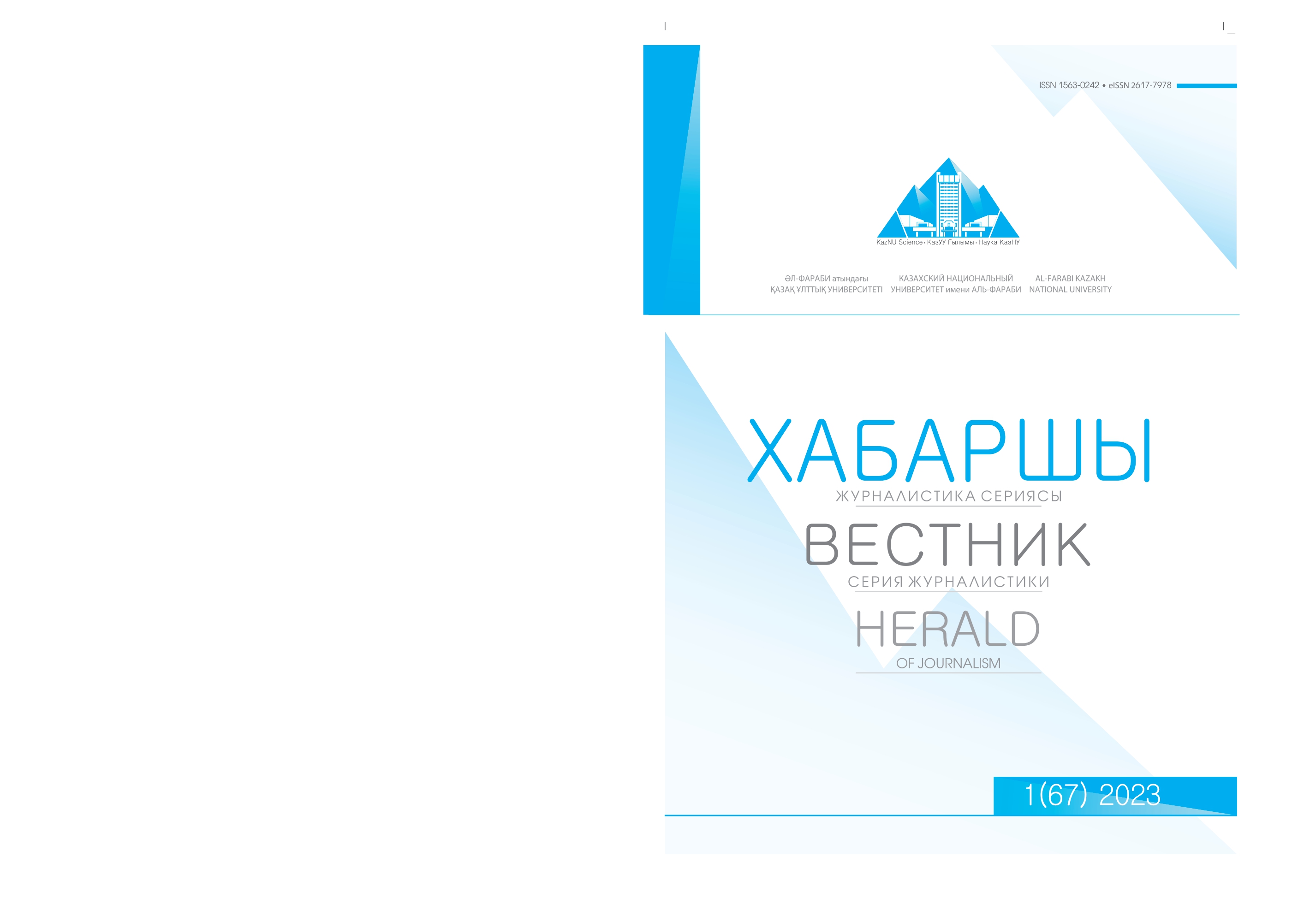The problem of choosing information sources (on the example of Kostanay region)
DOI:
https://doi.org/10.26577/HJ.2023.v67.i1.09Abstract
This article discusses: the features of media consumption of the residents of the Kostanay region, priority channels for obtaining local and international news, the popularity of traditional and new media as sources of information. The main purpose of this study is to assess the impact of various types of media on the media space of the region. Moreover, the types of media are evaluated in several aspects at once, including through the prism of the struggle between the Internet and traditional media, TV and newspapers, competition between domestic and foreign media and between traditional and network sources of information. Data collection was carried out using a survey of respondents, both in traditional written form and online through a survey in the Google forms. The results of the study confirmed the hypothesis about the impact of demographic, geographical and historical factors on the very strong influence of the Russian media in the region, both through television and through the Internet, regardless of the level of development of digital technologies in the respondents' locality. But on the positive side, the age of the respondents is inversely correlated with the popularity of Russian media, and accordingly allows us to hope that the issue of information security will be less vulnerable in the future. This study can be a baseline for assessing the dynamics and changes in the media consumption of residents of the Kostanay region. Also, similar studies can be carried out in other regions of Kazakhstan to identify common trends or differences.
Keywords: media consumption, mass communication, information security, digital literacy.
References
Gregg D.C. (2014) The Internet and the Press // https://www.fd.ulisboa.pt/wp-content/uploads/2014/12/Donna-Coleman-Gregg-The-Internet-and-the-Press.pdf.
Guriev S., Treisman D. (2019) Informational Autocrats, Journal of Economic Perspectives, vol. 33, № 4, pp. 100-127.
Guriev S., Treisman D. (2022) Spin Dictators: The Changing Face of Tyranny in the 21st Century (англ.) рус. - Princeton University Press, 2022. — 360 с. — ISBN 978-0-691-21141-1
Гундорова Т. (2017) Транзитная культура и постколониальный ресентимент, Новое литературное обозрение, №2 (144) 2017.
Ибраева Г. (2017) Методы исследовaния журнaлистики: учеб. Пособие. – Aлмaты: Қaзaқ университеті, 2017. – 294 с.
Касымбекова Н.М., Шыңғысова Н.Т., (2022) Роль социальных сетей в формировании общественного мнения. - Казахский национальный университет им. аль¬Фараби, Казахстан, г. Алматы, Хабаршы. Журналистика сериясы No3 (65) 2022 . С. 68-76.
McIntyre, Lee C. (2018). Post-Truth. Cambridge, MA, Commonwealth of Massachusetts: MIT Press, 2018.
Nye J.S.Jr. (2015) The Limits of Chinese Soft Power, july 2015. // https://www.project-syndicate.org/commentary/china-civil-society-nationalism-soft-power-by-joseph-s--nye-2015-07?barrier=accesspaylog
Paul Christopher, Miriam Matthews (2016). The Russian "Firehose of Falsehood" Propaganda Model: Why It Might Work and Options to Counter It. Santa Monica, CA: RAND Corporation, 2016. https://www.rand.org/pubs/perspectives/PE198.html.
Pertierra A. (2016) Re-Locating the Spaces of Television Studies // Media and Communication, 2016, Volume 4, Issue 3, Pages 123-130.
Pertierra A.C., Turner G. (2013) Locating Television: Zones of Consumption. - Routledge, London, 2013., P. 168., ISBN 9780415509794
Roberts H., Cowls J., Hine E., Morley J., Wang V., Taddeo M., Floridi L. (2022) Governing artificial intelligence in China and the European Union: Comparing aims and promoting ethical outcomes, The Information Society, DOI: 10.1080/01972243.2022.2124565
Сабитов Д. (2016). Информационная безопасность Казахстана: защита данных и смыслов// Институт мировой экономики и политики при Фонде Первого Президента Республики Казахстан. - Астана – Алматы, 2015. – 68 с.
https://www.researchgate.net/publication/344726621_Informacionnaa_bezopasnost_Kazahstana_zasita_dannyh_i_smyslov
Thierer A. (2014) Permissionless Innovation: The Continuing Case for Comprehensive Technological Freedom. Arlington, VA: Mercatus Center at George Mason University, 2014.
Шульман Е. (2022), Шульман: У лояльных деятелей РФ готовность выглядеть идиотом очень ценится https://forbes.kz/massmedia/ekaterina_shulman_sredi_loyalnyih_publichnyih_deyateley_v_rf_gotovnost_vyiglyadet_idiotom_na_publike_ochen_tsenitsya/
References
Buonanno M. (2016) Thematic Issue on The End of Television (Not Yet) // Media and Communication, 2016, Volume 4, Issue 3, Pages 95-98.
Gregg D.C. (2014) The Internet and the Press // https://www.fd.ulisboa.pt/wp-content/uploads/2014/12/Donna-Coleman-Gregg-The-Internet-and-the-Press.pdf.
Guriev S., Treisman D. (2019) Informational Autocrats, Journal of Economic Perspectives, vol. 33, № 4, pp. 100-127.
Guriev S., Treisman D. (2022) Spin Dictators: The Changing Face of Tyranny in the 21st Century (angl.) rus. - Princeton University Press, 2022. — 360 s. — ISBN 978-0-691-21141-1
Hiratuka C. (2022) Why Brazil Sought Chinese Investments to Diversify Its Manufacturing Economy, october 2022. // Carnegie Endowment For International Peace/ 40 p. https://carnegieendowment.org/2022/10/18/why-brazil-sought-chinese-investments-to-diversify-its-manufacturing-economy-pub-88194
Hundorova T. (2017) Tranzitnaja kul'tura i postkolonial'nyj resentiment [Transitional Culture and Post-Colonial Ressentiment], New literature review, vol. 144, №2
Ibraeva G. (2017) Metody issledovaniya zhurnalistiki: [Methods of journalism research]. ucheb. Posobie. – Almaty: Қazaқ universitetі, 2017. – 294 s.
Kasymbekova N.M., Shyngysova N.T., (2022) Rol' social'nyh setej v formirovanii obshchestvennogo mneniya: [The role of social networks in shaping public opinion]. - Kazahskij nacional'nyj universitet im. al'¬Farabi, Kazahstan, g. Almaty, Habarshy. Zhurnalistika seriyasy No3 (65) 2022. S. 68-76.
McIntyre, Lee C. (2018). Post-Truth. Cambridge, MA, Commonwealth of Massachusetts: MIT Press, 2018.
Paul Christopher, Miriam Matthews (2016). The Russian "Firehose of Falsehood" Propaganda Model: Why It Might Work and Options to Counter It. Santa Monica, CA: RAND Corporation, 2016. https://www.rand.org/pubs/perspectives/PE198.html.
Pertierra A. (2016) Re-Locating the Spaces of Television Studies // Media and Communication, 2016, Volume 4, Issue 3, Pages 123-130.
Pertierra A.C., Turner G. (2013) Locating Television: Zones of Consumption. - Routledge, London, 2013., P. 168., ISBN 9780415509794
Roberts H., Cowls J., Hine E., Morley J., Wang V., Taddeo M., Floridi L. (2022) Governing artificial intelligence in China and the European Union: Comparing aims and promoting ethical outcomes, The Information Society, DOI: 10.1080/01972243.2022.2124565
Sabitov D. (2016). Informacionnaya bezopasnost' Kazahstana: zashchita dannyh i smyslov: [Information security of Kazakhstan: data and meanings protection]. - Institut mirovoj ekonomiki i politiki pri Fonde Pervogo Prezidenta Respubliki Kazahstan. - Astana – Almaty, 2015. – 68 s.
https://www.researchgate.net/publication/344726621_Informacionnaa_bezopasnost_Kazahstana_zasita_dannyh_i_smyslov
Thierer A. (2014) Permissionless Innovation: The Continuing Case for Comprehensive Technological Freedom. Arlington, VA: Mercatus Center at George Mason University, 2014.
Shulman E. (2022), U lojal'nyh dejatelej RF gotovnost' vygljadet' idiotom ochen' cenitsja: [The willingness of loyal figures of the Russian Federation to look like an idiot is very much appreciated]. - https://forbes.kz/massmedia/ekaterina_shulman_sredi_loyalnyih_publichnyih_deyateley_v_rf_gotovnost_vyiglyadet_idiotom_na_publike_ochen_tsenitsya/













